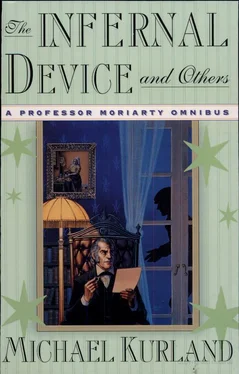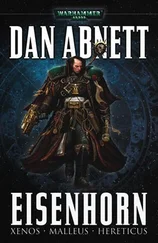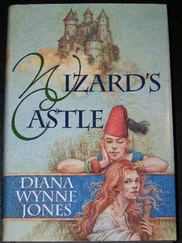"Lord Walbine had a pocket watch on his person," Holmes said, "crafted by Pronzini and Wilcox. The cloisonné inlay work on the case alone should have made it a national treasure. I can't think of anything more portable. Even the meanest fence would feel guilty at offering less than five hundred pounds for it."
"The villain, whoever he is, might have missed it," Lord Arundale said.
"Isadore Stanhope had a ruby stickpin the size of a robin's egg," Holmes said. "George Venn had fifty pounds in Bank of England notes on the table by his bed. Sir Geoffrey Cruikstaff had a solid gold cigarette case in his pocket and an extensive coin collection in the top drawer of his secretary. None of these was disturbed."
"Then nothing was taken?" d'Hiver asked.
"I believe," Holmes said carefully, "that something was taken. The murderer searched for and found some small object at the scene of each of his killings. That object is what he took away with him."
"What object?" Lord Arundale asked.
"That I don't know," Holmes said. "Inferential evidence suggests that it was small, unremarkable, easily concealed on the person, and of little intrinsic value."
"You say the killer took something from each of his victims?
What sort of thing do you suppose it could be?" Count d'Hiver asked.
"A key, perhaps," Holmes said. "Or a medallion or signet of some sort."
"Key to what?" Lord Arundale asked.
Holmes smiled. "I would welcome ideas as to that, my lord. The only thing I would suggest is that whatever the object is, it was an identical object for each of the victims."
Count d'Hiver stared silently at Holmes, his thoughts clearly somewhere else. Lord Arundale tapped his fingernails on the polished surface of his desk thoughtfully. "Some small object," he said, "taken from each of the victims, and identical in each case. Why do you feel that it's the same object in each case?"
"The murderer was certainly looking for some specific object," Holmes said. "Such insistence would indicate that the object, whatever it was, must be in some way part of the motive for the crime. Surely it would be stretching the bounds of credulity to suggest that it was a different object in each case."
"I don't know about that," Count d'Hiver said. "Perhaps our killer is some sort of fetishist. Perhaps he merely wants some small memento from each of his victims. Something to wear on his watch chain."
"Perhaps." Holmes stood up. "Is there any further way in which I can assist or enlighten either of you gentlemen at the moment? No? Then I shall get back to my investigations. It may be that with luck I can prevent another killing. But I am not sanguine, my lords. I am afraid that there will be more blood shed before we reach the bottom of this."
"Keep us informed," Lord Arundale said. "I shall, my lord," Holmes assured him.
FIFTEEN — A MODEST PROPOSAL
When Chloris to the temple comes,
Adoring crowds before her fall:
She can restore the dead from tombs,
And every life but mine recall.
I only am by love designed
To be the victim for mankind.
— John Dryden
When one is in the grip of a powerful emotion, small events can hold magnified significance. Benjamin Barnett paused at a flower stall on his way to lunch with Cecily Perrine and purchased a bunch of violets. Then, as he walked the last few blocks to the restaurant, he found himself staring at the flowers and thinking what a paltry, inappropriate gift they were for the woman one intended to marry. This thought grew into a conviction, and so he paused at a confectioner's and selected a pound of mixed chocolates, which were wrapped in fancy paper and tied with a bow. But then, after he had paid for the chocolates, the indecision returned, and he found himself unable to choose between the flowers and the chocolates.
The problem, Barnett realized, was not with the gifts. He would have liked to have given her something major, something important — a ring, a pendant, a brooch speckled with precious gems — but he couldn't very well do that. It would be in very bad taste until after he had asked her father formally for her hand. But under the circumstances, limited to a token gift, flowers were nice. Chocolates were acceptable. It was the imminent proposal itself that was making his hands go clammy and his heart beat triple-time against his chest. He certainly wanted to ask her — more than anything in the world he wanted Cecily Perrine to be his wife. He fully intended to ask her.
But he wasn't sure that he actually could. He felt his heartbeat increase in speed and pressure as he just walked along with a bunch of flowers under one arm, a pound of chocolates under the other elbow, and thought about proposing to Cecily.
What if she turns me down? he thought. What if she smiles at me gently and says, "Benjamin, you know that I do love you — but it is like a brother. I've never thought of you the other way!" After all, it could happen. He knew she was fond of him, but he had no assurance that it went beyond that. What if she laughed at him?
On the whole, Barnett decided, women had it much better in this society than men did. Men had to do the asking. Everything from "May I have this dance?" to "Will you marry me?" If a woman was rejected it was indirect, by not being asked; and if no one knew that she expected to be asked, then it remained a private, personal grief. Romantic traces of such past opportunity lost could be seen as a secret anguish in love-haunted eyes. A man was rejected as a public act, a direct holding up of one's innermost desires and most private feelings to the jeers of the crowd, a humiliation that could be felt as a physical wrenching, like a knife in the pit of the stomach.
When Barnett reached the front door of Hempelmayer's, he still had to choose between the chocolates and the flowers. Walking in with both, he was convinced, would make him look ridiculous. And if there's anything a man in love cannot stand, it is to look ridiculous. Especially since he realizes that in word and deed, he is already sufficiently ridiculous with no external aid. Or so Mr. Wilde, the American News Service's favorite epigrammatist, would maintain. But then, Mr. Wilde didn't seem to like women very much.
Barnett looked at his two purchases and realized that he would have to make an arbitrary decision.
"Are you married?" he asked the elderly doorman who pulled open the ornate brass-on-glass door for him.
"For these past twenty-eight years, sir," the doorman told him. "Nine little ones. Some of 'em nary so little anymore."
"Well then, here," Barnett said, handing the man the elaborately wrapped box of chocolates. "A present for your wife."
"Thank ye, sir." The doorman touched the brim of his uniform cap with his knuckle. "Thank ye very much."
Cecily was perched like a princess on an overstuffed plush couch in the anteroom, waiting for Barnett. "About time you arrived," she said. "You are a quarter of an hour late."
"I'm sorry," Barnett said. "I didn't realize the time. My watch must be slow. I stopped to get you some flowers. Violets. Here." He thrust the bunch at her.
"Well, that's very nice," Cecily said in an insincere voice. "Quite thoughtful of you." She rose and took the tissue-paper-wrapped bunch, holding them at arm's length, as though they had a bad odor. "I'll just leave them in the cloakroom until after our meal."
"I'll do it," Barnett said, retrieving the vegetation. "I have to hang up my topcoat anyhow." He disposed of his coat and the flowers in the cloakroom and returned. A short, fussy man with a prim mustache showed them to their table, presented them with their menus, and pranced off. Barnett looked across the table at Cecily. "Would you have preferred chocolates?" he asked. "It will just take me a second to switch with the doorman."
Читать дальше












